Oracle-Datenwörterbuch, Datenwörterbuchansicht und dynamische Leistungsansicht (Zusammenfassungsfreigabe)
- WBOYWBOYWBOYWBOYWBOYWBOYWBOYWBOYWBOYWBOYWBOYWBOYWBnach vorne
- 2022-07-06 13:58:542091Durchsuche
Dieser Artikel vermittelt Ihnen relevantes Wissen über Oracle, das hauptsächlich Probleme im Zusammenhang mit dem Datenwörterbuch, der Datenwörterbuchansicht und der dynamischen Leistungsansicht organisiert. Das Datenwörterbuch zeichnet die grundlegendsten Informationen der Datenbank auf, einschließlich der Grundtabellen des Datenwörterbuchs Werfen wir einen Blick auf die Datenwörterbuchansicht. Ich hoffe, sie ist für alle hilfreich.

Empfohlenes Tutorial: „Oracle Video Tutorial“ Datenwörterbuch Die Basistabelle wird von $ORACLE_HOMERDBMSADMINsql.bsq erstellt. Die Basistabelle des Datenwörterbuchs gehört dem Systembenutzer und wird im Systemtabellenbereich gespeichert Datenwörterbuch;
Um die Verwendung der Basistabelle des Datenwörterbuchs zu vereinfachen, stellt Oracle eine Datenwörterbuchansicht bereit und erstellt auch öffentliche Synonyme für die Datenwörterbuchansicht, die für Benutzer praktisch ist Synonyme werden über Catalog.sql erstellt1.2 Datenwörterbuchansicht1.2.1 Drei Typen
USER _ Ansichtstyp stellt die Informationen dar, die dem aktuell angemeldeten Benutzer gehören;ALL_ Ansichtstyp stellt die Informationen dar, die der aktuell angemeldete Benutzer hat in Benutzer hat die Berechtigung zum Anzeigen;
DBA_-Ansichtstyp stellt die Informationen dar, die der Datenbankadministrator sehen kann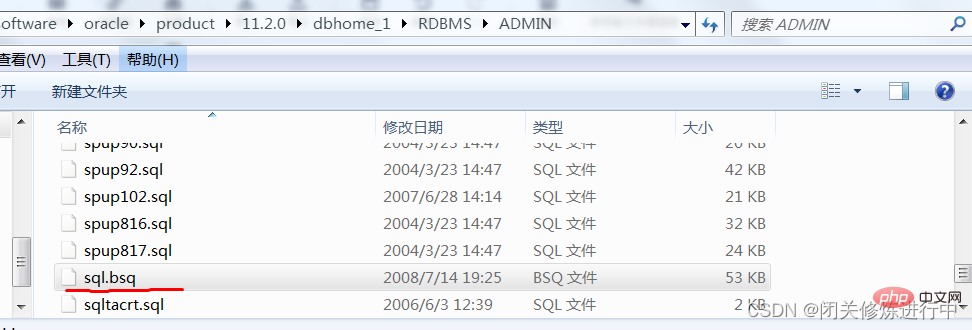 wie:
wie: 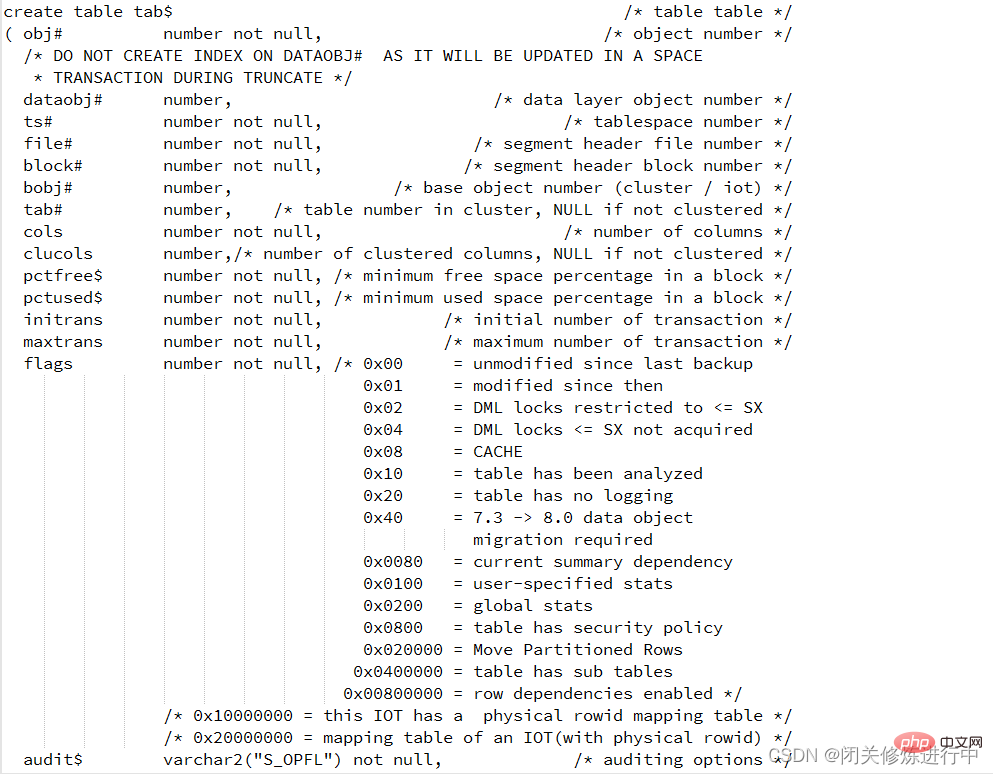 (1) USER_type (user_tables)
(1) USER_type (user_tables)
entspricht zwei Datenbankobjekten, eines ist eine Datenwörterbuchansicht und Das andere ist ein Synonym. Die Datenwörterbuchansicht wird zuerst basierend auf der Datenwörterbuchtabelle erstellt, und dann wird ein Synonym mit demselben Namen für die Ansicht erstellt.
Fragen Sie das Datenbankobjekt ab, das USER_TABLES entspricht:
select * from dba_objects d where d.OBJECT_NAME='USER_TABLES';Ansicht entsprechend USER_TABLES:
select * from dba_views d where d.view_name='USER_TABLES';
Fragen Sie die Erstellungsanweisung der Ansicht ab, die USER_TABLES entspricht:
SQL> SET LONG 10000;SQL> select d.text from dba_views d where d.view_name='USER_TABLES';TEXT--------------------------------------------------------------------------------select o.name,
decode(bitand(t.property,2151678048), 0, ts.name,
decode(t.ts#, 0, null, ts.name)),
decode(bitand(t.property, 1024), 0, null, co.name),
decode((bitand(t.property, 512)+bitand(t.flags, 536870912)),
0, null, co.name),
decode(bitand(t.trigflag, 1073741824), 1073741824, 'UNUSABLE', 'VALID'),
decode(bitand(t.property, 32+64), 0, mod(t.pctfree$, 100), 64, 0, null),
decode(bitand(ts.flags, 32), 32, to_number(NULL),
decode(bitand(t.property, 32+64), 0, t.pctused$, 64, 0, null)),
decode(bitand(t.property, 32), 0, t.initrans, null),
decode(bitand(t.property, 32), 0, t.maxtrans, null),
decode(bitand(t.property, 17179869184), 17179869184,
ds.initial_stg * ts.blocksize,
s.iniexts * ts.blocksize),
decode(bitand(t.property, 17179869184), 17179869184,
ds.next_stg * ts.blocksize,
s.extsize * ts.blocksize),
decode(bitand(t.property, 17179869184), 17179869184,
ds.minext_stg, s.minexts),
decode(bitand(t.property, 17179869184), 17179869184,
ds.maxext_stg, s.maxexts),
decode(bitand(ts.flags, 3), 1, to_number(NULL),
decode(bitand(t.property, 17179869184), 17179869184,
ds.pctinc_stg, s.extpct)),
decode(bitand(ts.flags, 32), 32, to_number(NULL),
decode(bitand(o.flags, 2), 2, 1,
decode(bitand(t.property, 17179869184), 17179869184,
ds.frlins_stg, decode(s.lists, 0, 1, s.lists)))),
decode(bitand(ts.flags, 32), 32, to_number(NULL),
decode(bitand(o.flags, 2), 2, 1,
decode(bitand(t.property, 17179869184), 17179869184,
ds.maxins_stg, decode(s.groups, 0, 1, s.groups)))),
decode(bitand(t.property, 32+64), 0,
decode(bitand(t.flags, 32), 0, 'YES', 'NO'), null),
decode(bitand(t.flags,1), 0, 'Y', 1, 'N', '?'),
t.rowcnt,
decode(bitand(t.property, 64), 0, t.blkcnt, null),
decode(bitand(t.property, 64), 0, t.empcnt, null),
decode(bitand(t.property, 64), 0, t.avgspc, null),
t.chncnt, t.avgrln, t.avgspc_flb,
decode(bitand(t.property, 64), 0, t.flbcnt, null),
lpad(decode(t.degree, 32767, 'DEFAULT', nvl(t.degree,1)),10),
lpad(decode(t.instances, 32767, 'DEFAULT', nvl(t.instances,1)),10),
lpad(decode(bitand(t.flags, 8), 8, 'Y', 'N'),5),
decode(bitand(t.flags, 6), 0, 'ENABLED', 'DISABLED'),
t.samplesize, t.analyzetime,
decode(bitand(t.property, 32), 32, 'YES', 'NO'),
decode(bitand(t.property, 64), 64, 'IOT',
decode(bitand(t.property, 512), 512, 'IOT_OVERFLOW',
decode(bitand(t.flags, 536870912), 536870912, 'IOT_MAPPING', null))),
decode(bitand(o.flags, 2), 0, 'N', 2, 'Y', 'N'),
decode(bitand(o.flags, 16), 0, 'N', 16, 'Y', 'N'),
decode(bitand(t.property, 8192), 8192, 'YES',
decode(bitand(t.property, 1), 0, 'NO', 'YES')),
decode(bitand(o.flags, 2), 2, 'DEFAULT',
decode(bitand(decode(bitand(t.property, 17179869184), 17179869184,
ds.bfp_stg, s.cachehint), 3),
1, 'KEEP', 2, 'RECYCLE', 'DEFAULT')),
decode(bitand(o.flags, 2), 2, 'DEFAULT',
decode(bitand(decode(bitand(t.property, 17179869184), 17179869184,
ds.bfp_stg, s.cachehint), 12)/4,
1, 'KEEP', 2, 'NONE', 'DEFAULT')),
decode(bitand(o.flags, 2), 2, 'DEFAULT',
decode(bitand(decode(bitand(t.property, 17179869184), 17179869184,
ds.bfp_stg, s.cachehint), 48)/16,
1, 'KEEP', 2, 'NONE', 'DEFAULT')),
decode(bitand(t.flags, 131072), 131072, 'ENABLED', 'DISABLED'),
decode(bitand(t.flags, 512), 0, 'NO', 'YES'),
decode(bitand(t.flags, 256), 0, 'NO', 'YES'),
decode(bitand(o.flags, 2), 0, NULL,
decode(bitand(t.property, 8388608), 8388608,
'SYS$SESSION', 'SYS$TRANSACTION')),
decode(bitand(t.flags, 1024), 1024, 'ENABLED', 'DISABLED'),
decode(bitand(o.flags, 2), 2, 'NO',
decode(bitand(t.property, 2147483648), 2147483648, 'NO',
decode(ksppcv.ksppstvl, 'TRUE', 'YES', 'NO'))),
decode(bitand(t.property, 1024), 0, null, cu.name),
decode(bitand(t.flags, 8388608), 8388608, 'ENABLED', 'DISABLED'),
case when (bitand(t.property, 32) = 32) then
null
when (bitand(t.property, 17179869184) = 17179869184) then
decode(bitand(ds.flags_stg, 4), 4, 'ENABLED', 'DISABLED')
else
decode(bitand(s.spare1, 2048), 2048, 'ENABLED', 'DISABLED')
end,
case when (bitand(t.property, 32) = 32) then
null
when (bitand(t.property, 17179869184) = 17179869184) then
decode(bitand(ds.flags_stg, 4), 4,
case when bitand(ds.cmpflag_stg, 3) = 1 then 'BASIC'
when bitand(ds.cmpflag_stg, 3) = 2 then 'OLTP'
else decode(ds.cmplvl_stg, 1, 'QUERY LOW',
2, 'QUERY HIGH',
3, 'ARCHIVE LOW',
'ARCHIVE HIGH') end,
null)
else
decode(bitand(s.spare1, 2048), 0, null,
case when bitand(s.spare1, 16777216) = 16777216 -- 0x1000000
then 'OLTP'
when bitand(s.spare1, 100663296) = 33554432 -- 0x2000000
then 'QUERY LOW'
when bitand(s.spare1, 100663296) = 67108864 -- 0x4000000
then 'QUERY HIGH'
when bitand(s.spare1, 100663296) = 100663296 -- 0x2000000+0x4000000
then 'ARCHIVE LOW'
when bitand(s.spare1, 134217728) = 134217728 -- 0x8000000
then 'ARCHIVE HIGH'
else 'BASIC' end)
end,
decode(bitand(o.flags, 128), 128, 'YES', 'NO'),
decode(bitand(t.trigflag, 2097152), 2097152, 'YES', 'NO'),
decode(bitand(t.property, 17179869184), 17179869184, 'NO',
decode(bitand(t.property, 32), 32, 'N/A', 'YES')),
decode(bitand(t.property,16492674416640),2199023255552,'FORCE',
4398046511104,'MANUAL','DEFAULT')from sys.ts$ ts, sys.seg$ s, sys.obj$ co, sys.tab$ t, sys.obj$ o,
sys.deferred_stg$ ds, sys.obj$ cx, sys.user$ cu, x$ksppcv ksppcv,
x$ksppi ksppiwhere o.owner# = userenv('SCHEMAID')
and o.obj# = t.obj#
and bitand(t.property, 1) = 0
and bitand(o.flags, 128) = 0
and t.bobj# = co.obj# (+)
and t.ts# = ts.ts#
and t.file# = s.file# (+)
and t.block# = s.block# (+)
and t.ts# = s.ts# (+)
and t.obj# = ds.obj# (+)
and t.dataobj# = cx.obj# (+)
and cx.owner# = cu.user# (+)
and ksppi.indx = ksppcv.indx and ksppi.ksppinm = '_dml_monitoring_enabled'
Synonyme abfragen:
select * from dba_synonyms d where d.synonym_name='USER_TABLES'
Fragen Sie die aktuelle Anmeldetabelle des Benutzers ab
(2) ALL_-Typ ( all_tables)


2. Dynamische Leistungsansicht
 2.1 Konzepte
2.1 Konzepte
Jede der Datenbanken in der Speicherdatenbank alle Die Informationen, die sich jeden Moment ändern, sind hauptsächlich die Aktivitätsstatusinformationen der Datenbank. Zeigen Sie die im Speicher gespeicherten Informationen und die in der Steuerdatei gespeicherten Informationen in Form einer Ansicht an 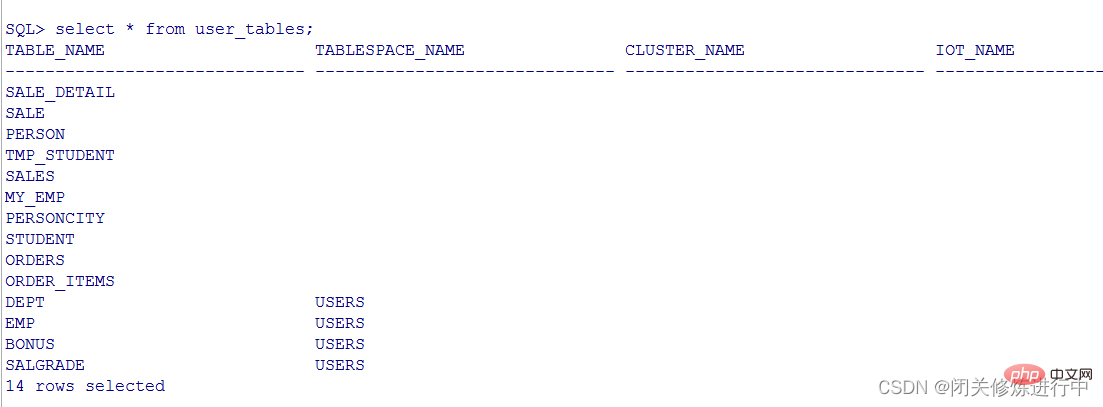
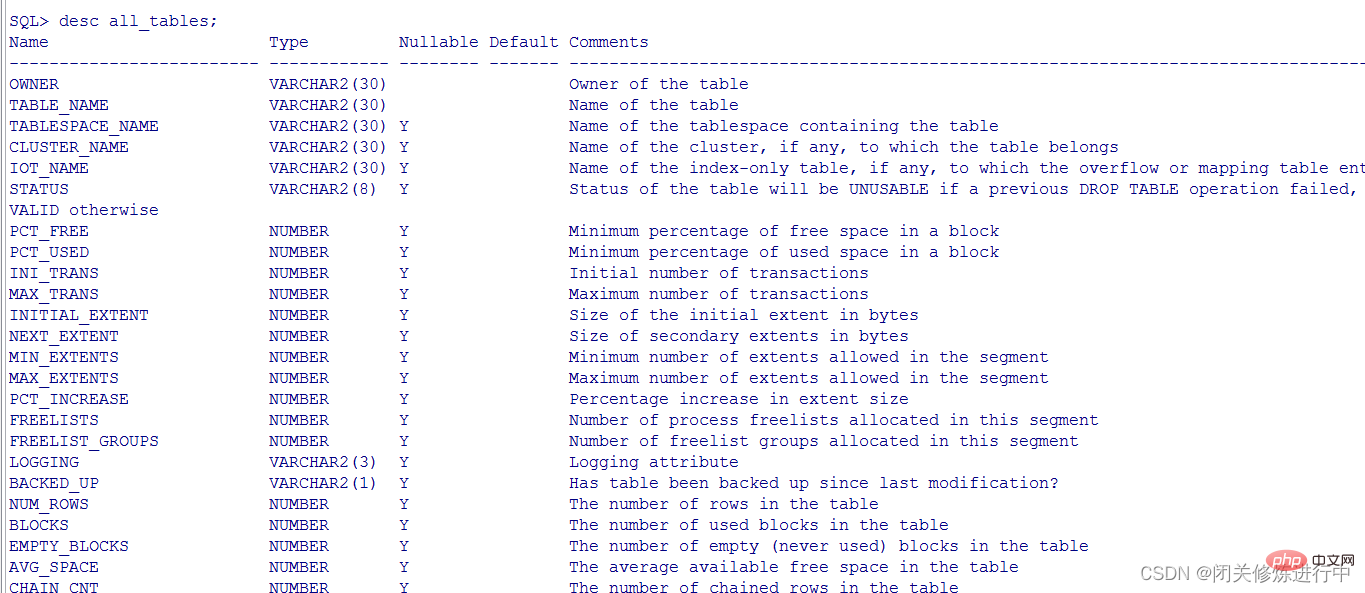
v$session
Informationen zur Sitzung
Systemstatistik basierend auf der aktuellen Betriebssitzung
v$logExtract Informationen zur Redo-Log-Gruppe aus der Steuerdatei
v$logfile
Informationen zum Dateinamen der Instanz-Redo-Log-Gruppe und ihrem Speicherort
v$lock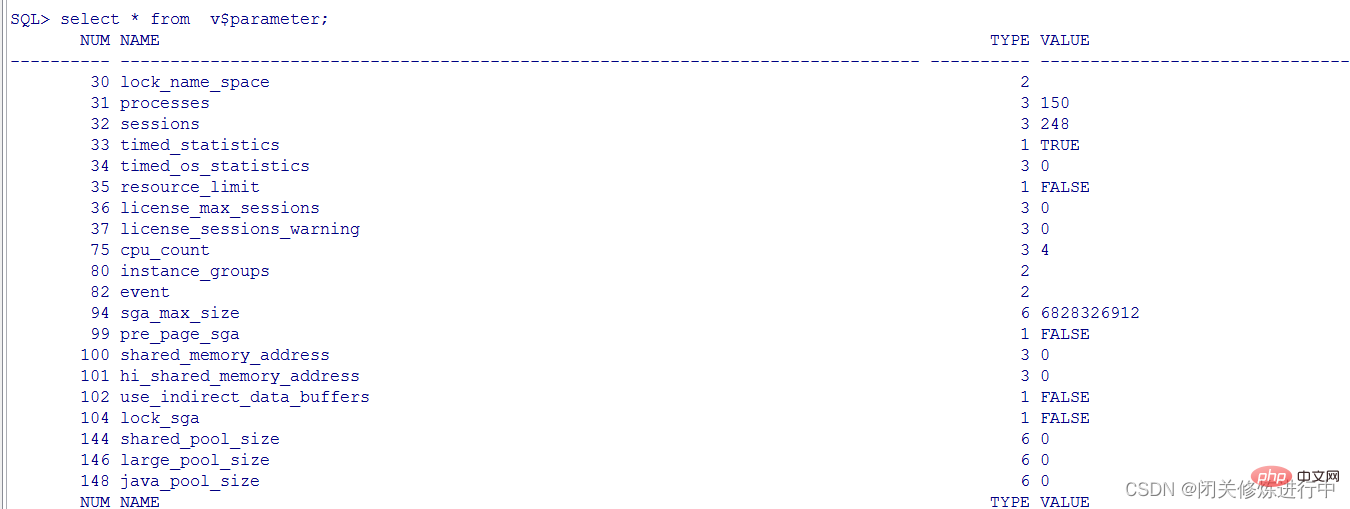
v$transaction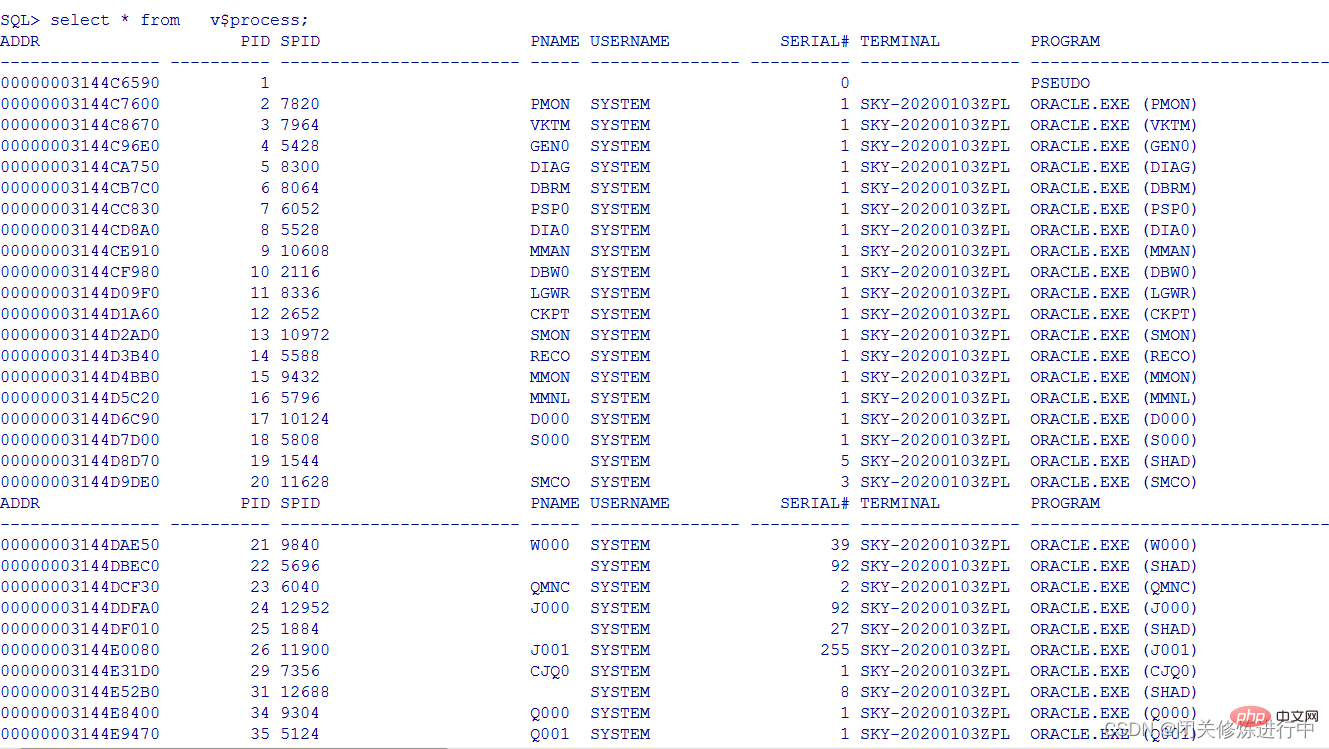
v$fixed_view_definition
Zeichnen Sie die Definitionsinformationen aller dynamischen Leistungsansichten auf
Empfohlenes Tutorial: „Oracle Video Tutorial“
Das obige ist der detaillierte Inhalt vonOracle-Datenwörterbuch, Datenwörterbuchansicht und dynamische Leistungsansicht (Zusammenfassungsfreigabe). Für weitere Informationen folgen Sie bitte anderen verwandten Artikeln auf der PHP chinesischen Website!

